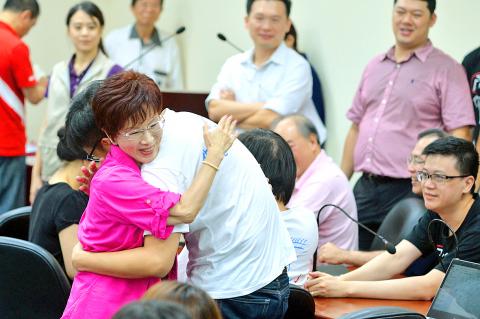Deputy Legislative Speaker Hung Hsiu-chu (洪秀柱) yesterday passed the 30 percent threshold in the Chinese Nationalist Party’s (KMT) three presidential primary polls yesterday, with an average approval rating of 46.203 percent.
Hung, who was the only contender, can now be nominated by the KMT to run in the presidential election in January next year.
She thanked her supporters during a news conference at the KMT’s headquarters in Taipei.

Photo: CNA
“This is only the first step,” Hung said, adding that she would move forward with greater confidence to secure the nomination.
Hung said she expects the KMT’s national party convention on Friday to formally pick her as the party’s presidential nominee and that a presidential election between two women would mark a new page in the development of democracy in Taiwan.
According to KMT sources, “hesitation and cowardice” by the so-called “KMT heavyweights” in failing to run in the primary drove party members to support Hung and helped her pass the primary poll threshold.
The polls were organized by three agencies — Trengo, Statinc and the United Daily News — each of which was required to collect more than 1,200 valid samples.
The polls measured Hung’s approval rating running alone and against Democratic Progressive Party Chairperson and presidential candidate Tsai Ing-wen (蔡英文). The final results were an average of the two scenarios in the three polls.
KMT Vice Chairman Hau Lung-bin (郝龍斌) yesterday said the high approval rating demonstrated that Hung had wide support among the public.
“Hung’s insistence on throwing her hat into the ring and her position on the future of our party has encouraged many supporters. We are proud of her,” Hau said.
Hau said he would convene a meeting of the nomination and auditing committee tomorrow to confirm the outcome of the polls before submitting the results to the KMT’s Central Standing Committee on Wednesday.
Hung yesterday said political views, professional ethics and age would be important considerations when selecting a running mate.
Hung added that she has a rough idea about who she wants as her vice presidential candidate, but declined to elaborate any further.
Hung, 67, said she expects her running mate to be younger than her, have the same political views, a positive moral character, impeccable professional ethics and a background that complements her own.
Meanwhile, KMT Chairman Eric Chu (朱立倫) said he is happy about the outcome of the primary and added that Hung’s nomination would be processed according to party rules.
According to Chu, Hung’s nomination would first be confirmed by the nomination committee and then submitted to the Central Standing Committee, which meets on Wednesdays, for approval.
President Ma Ying-jeou (馬英九) would fully support whichever candidate the KMT nominates to run in the next presidential election, Presidential Office spokesman Charles Chen (陳以信) said yesterday.
“As a member of the KMT, President Ma will extend his backing to the candidate nominated by the party,” Chen said.
If nominated by the KMT, Hung would run against Tsai, who lost the 2012 presidential race to Ma.

NATIONAL SECURITY THREAT: An official said that Guan Guan’s comments had gone beyond the threshold of free speech, as she advocated for the destruction of the ROC China-born media influencer Guan Guan’s (關關) residency permit has been revoked for repeatedly posting pro-China content that threatens national security, the National Immigration Agency said yesterday. Guan Guan has said many controversial things in her videos posted to Douyin (抖音), including “the red flag will soon be painted all over Taiwan” and “Taiwan is an inseparable part of China,” while expressing hope for expedited “reunification.” The agency received multiple reports alleging that Guan Guan had advocated for armed reunification last year. After investigating, the agency last month issued a notice requiring her to appear and account for her actions. Guan Guan appeared as required,

A Vietnamese migrant worker yesterday won NT$12 million (US$379,627) on a Lunar New Year scratch card in Kaohsiung as part of Taiwan Lottery Co’s (台灣彩券) “NT$12 Million Grand Fortune” (1200萬大吉利) game. The man was the first top-prize winner of the new game launched on Jan. 6 to mark the Lunar New Year. Three Vietnamese migrant workers visited a Taiwan Lottery shop on Xinyue Street in Kaohsiung’s Gangshan District (崗山), a store representative said. The player bought multiple tickets and, after winning nothing, held the final lottery ticket in one hand and rubbed the store’s statue of the Maitreya Buddha’s belly with the other,

‘NATO-PLUS’: ‘Our strategic partners in the Indo-Pacific are facing increasing aggression by the Chinese Communist Party,’ US Representative Rob Wittman said The US House of Representatives on Monday released its version of the Consolidated Appropriations Act, which includes US$1.15 billion to support security cooperation with Taiwan. The omnibus act, covering US$1.2 trillion of spending, allocates US$1 billion for the Taiwan Security Cooperation Initiative, as well as US$150 million for the replacement of defense articles and reimbursement of defense services provided to Taiwan. The fund allocations were based on the US National Defense Authorization Act for fiscal 2026 that was passed by the US Congress last month and authorized up to US$1 billion to the US Defense Security Cooperation Agency in support of the

CLASSIFIED BRIEFING: The ministry said the special budget focuses on building a comprehensive defense system and strengthening the domestic defense industry The Ministry of National Defense yesterday released information on seven categories of weapons systems to be procured under a stalled NT$1.25 trillion (US$39.57 billion) special defense budget, including precision artillery, long-range missiles, air defense anti-tank missiles and more than 200,000 uncrewed aerial vehicles (UAVs). The Executive Yuan approved a draft version of the budget on Nov. 27 last year and submitted it to the legislature for review. The legislature’s Foreign Affairs and National Defense Committee yesterday invited Minister of National Defense Wellington Koo (顧立雄) to deliver a classified briefing and answer questions at a closed-door session. Koo said he hoped to provide lawmakers